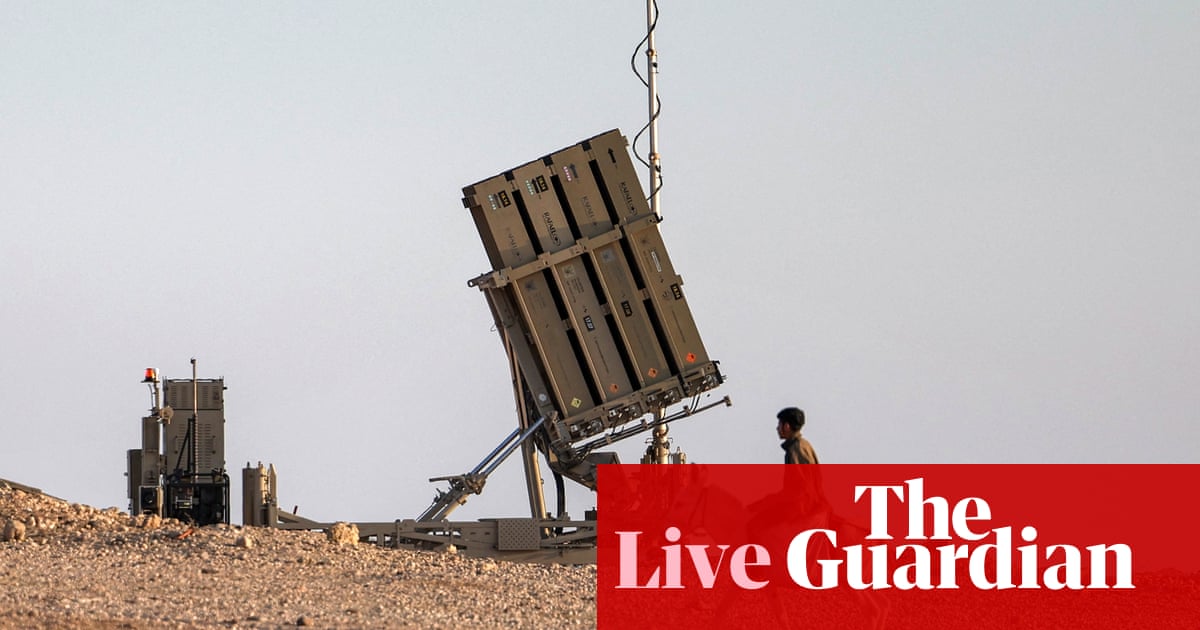UK foreign secretary Cameron: ‘reckless and dangerous’ attack on Israel was a ‘double defeat’ for Iran
Describing it as “a reckless and dangerous thing for Iran to have done”, the UK’s foreign secretary David Cameron said that Tehran’s attack was a “double defeat”, as it had failed to inflict damage on Israel, and that “they’ve revealed to the world that they are the malign influence in the region.”
On Sky News in the UK he stressed how large the attack had been, specifying that it had featured “301 weapons – 110 ballistic missiles and 40 cruise missiles. This was very significant.”
He said “if you’re sitting in Israel this morning, you’re thinking quite rightly, we have every right to respond to this, and they do, but we are urging that they shouldn’t escalate.”
He continued “our hope is that there won’t be a retaliatory response, and instead, the world’s focus should shift to Hamas. They still hold those hostages. They’ve been offered a deal that prisoners can be released from Israeli jails in return for some of those hostages, and there’ll be a pause in the fighting. That’s what needs to happen next.
“I think the smart thing to do is actually to recognise that Iran’s attack was a failure. And we want to keep the focus on that, on Iran’s malign influence, and actually pivot to looking at what’s happening in Gaza, and getting those hostages released.”
Key events
The Palestine Red Crescent Society has said that Israel has released two ambulance crews today that it had been detaining for 50 days. It says six other crews are still detained and their whereabouts are unknown. The two crews had been detained at an Israeli military checkpoint in Khan Younis.
⭕️Israeli forces released two PRCS ambulance crews today morning after a 50-day detention. They were arrested at a military checkpoint in Khan Younis while evacuating patients from #AlAmalHospital. The Israeli occupation continued to detain six PRCS crews until now, and their… pic.twitter.com/6tlgnoUylx
— PRCS (@PalestineRCS) April 15, 2024
Reuters reports that the European Union aviation safety agency said on Monday it continues to recommend caution in the airspaces of Iran and Israel, and also in a zone of about 100 nautical miles surrounding Israel.
UK foreign secretary Cameron appears to concede Iran had a right to respond to Israeli attack on Damascus consulate, but questions scale
In the UK, on Sky News, the UK’s foreign secretary David Cameron has been asked whether the UK would have retaliated if one of its diplomatic buildings had been flattened in another country, as Iran’s was in Syria. He appeared to concede that Iran had some right to respond to the destruction of its diplomatic building in Damascus, widely thought to have been carried out by Israel, but questioned the scale of Tehran’s response due to its potential to inflict civilian casualties.
Asked whether Israel had shown “good judgment” in attacking the Iranian consulate building in Syria and killing senior Iranian military commanders, the former UK prime minister said:
I can completely understand the frustration the Israelis feel when they look at the Iranian Revolutionary Guard, and they look at the terrible things that they have done all over the world, including the support they give to Hamas, and of course, Hamas were responsible for the 7 October attack and that is where all of this begins. So you can completely understand the frustration.
Pressed on Iran’s frustration about “part of its sovereign territory being flattened” when the diplomatic building was attacked, Cameron continued:
I would argue there is a massive degree of difference between what Israel did in Damascus, and 301 weapons being launched by the state of Iran at the state of Israel, for the first time a state on state attack. 101 ballistic missiles, 36 cruise missiles, 185 drones, that is a degree of difference. And I think a reckless and dangerous thing for Iran to have done, and I think the whole world can see. All these countries that have somehow wondered, well, you know, what is the true nature of Iran? It’s there in black and white.
He was then asked “what would Britain do if a hostile nation flattened one of our consulates?” to which he replied “Well, we would take very strong action.”
It was then put to him that Iran would argue that is what it has just done. Cameron responded “Well what they did, as I’ve said, was a massive attack.”
“So they were right to respond, but they over-reacted, is that what you are saying?” he was then asked. The UK’s foreign secretary then said:
What I’m saying is the attack they carried out was on a very large scale. Countries have a right to respond when they feel they’ve suffered an aggression, of course they do. But look at the scale of that response. Had those weapons not been shot down. There could have been thousands of casualties, including civilian casualties. I think that’s a really important point to take into account.
So far, since 7 October, the casualty count, which includes civilians, has included about 1,140 people killed in the initial Hamas attack in southern Israel, during which about 240 people were taken captive as hostages, and over 33,000 people reported killed inside the Gaza Strip by Israel’s military action there.
UK foreign secretary Cameron: ‘reckless and dangerous’ attack on Israel was a ‘double defeat’ for Iran
Describing it as “a reckless and dangerous thing for Iran to have done”, the UK’s foreign secretary David Cameron said that Tehran’s attack was a “double defeat”, as it had failed to inflict damage on Israel, and that “they’ve revealed to the world that they are the malign influence in the region.”
On Sky News in the UK he stressed how large the attack had been, specifying that it had featured “301 weapons – 110 ballistic missiles and 40 cruise missiles. This was very significant.”
He said “if you’re sitting in Israel this morning, you’re thinking quite rightly, we have every right to respond to this, and they do, but we are urging that they shouldn’t escalate.”
He continued “our hope is that there won’t be a retaliatory response, and instead, the world’s focus should shift to Hamas. They still hold those hostages. They’ve been offered a deal that prisoners can be released from Israeli jails in return for some of those hostages, and there’ll be a pause in the fighting. That’s what needs to happen next.
“I think the smart thing to do is actually to recognise that Iran’s attack was a failure. And we want to keep the focus on that, on Iran’s malign influence, and actually pivot to looking at what’s happening in Gaza, and getting those hostages released.”
UK foreign secretary Cameron: situation in Gaza remains ‘unacceptable’
The UK’s foreign secretary has questioned Benjamin Netanyahu’s judgment on the level of aid being allowed to enter Gaza, and said that he has had “tough conversations” with Israel on the topic.
Saying that he had “many arguments and disagreements” with Israel’s prime minister over the 20 years they have known each other, the former UK prime minister David Cameron said:
It’s our job to work with the Israeli government to support them in their campaign to get rid of Hamas, and I think that’s right. You can’t expect Israel to live next door to a territory that is governed by people that carried out the 7 October attacks, but our job is to work with Israeli Government.
We will have our disagreements. We have some very tough conversations with them, for instance, about the need to get aid into Gaza, where I’ve been extremely tough with them about that, but I think rightly because the situation in Gaza is unacceptable.
There are too many people going hungry. There are too many people that can’t get water and medicine. The Israelis have now said [there will be] 500 trucks a day, opening the port of Ashdod, getting more aid in, and that’s that’s hugely helpful, and we need to make sure that’s delivered.
Pressed specifically on where Netanyahu had shown bad judgment, Cameron said:
We have to work with the prime ministers and the governments that are there. He has good judgment on many things, but there are times that we prefer to disagree. When we do, we should have frank conversations. That’s what friends do.
I think not letting more aid into Gaza. That I think was a mistake. We were very frank with the Israelis all the way through that they needed to open up the crossing points. There [needs to be] a lot more trucks, the need to make sure there was proper deconfliction, so that aid workers can get around Gaza. And we wouldn’t have you know, further incidents like the terrible killing of the World Central Kitchen workers. I think it was a bad judgment not to open up Gaza to aid earlier. And we had that argument with him.
Archie Bland
For our First Edition newsletter today, Archie Bland spoke to Mohammad Ali Shabani, editor of Amwaj.media, a news website covering Iran, Iraq and the Arabian peninsula:
“The operation was heavily telegraphed and choreographed by Tehran,” Mohammad Ali Shabani said. “But it was still more than most analysts expected, including myself.”
“What happened was a spectacle – geared to make the world see,” Shabani said. “So there is a face-saving component. But it was signalled in advance, so that there was ample time for Israel and the United States to prepare. They are saying that the ball is now in Israel’s court.”
Shabani said, “even with the US out of the nuclear deal and Biden keeping the Trump-era sanctions, they are still talking – maybe through intermediaries, but they are still talking. [Iran] could have done a North Korea and cut off all contact, but they haven’t. What that suggests is that even with the conservatives building power, there is still a strong constituency in favour of diplomacy.”
Read more here: Monday briefing – The calculations and confusion that could lead Iran and Israel into all-out war
France’s interior minister Gérald Darmanin has posted to social media to say he asked local officials to step up security “at places visited by our Jewish compatriots, especially with regards to synagogues and Jewish schools.”
He said he was making the move “as Passover approaches and given the current international situation.”
On Sunday foreign minister Stéphane Séjourné confirmed that France participated in defending Israel from the attack by Iran, but did not specify in what capacity.
Summary of the day so far
It’s 9:30am in Tehran and 9am in Tel Aviv and Gaza. Before I handover to my colleague in London, Martin Belam, here’s a summary of the latest developments:
-
Israel has called for fresh sanctions on Iran at a tense meeting of the UN security council, called in the wake of Iran’s attacks on Israel. Israel’s UN envoy, Gilad Erdan, has urged the council to “impose all possible sanctions on Iran before it’s too late” and “condemn Iran for their terror”, reports Agence France-Presse. Iran launched explosive drones and missiles on Saturday – its first ever direct attack on Israeli territory.
-
Iran’s UN envoy, Amir Saeid Iravani, responded saying that the Islamic republic was exercising its “inherent right to self-defence” and “had no choice” but to act. He insisted his country did “not seek escalation or war”, but would respond to any “threat or aggression”.
-
United Nations secretary general António Guterres has called on members not to further escalate tensions with reprisals against Iran. “It’s time to step back from the brink,” Guterres said. “Neither the region nor the world can afford more war.”
-
Israel is quiet on its next steps against Iran, with an official reportedly saying the country’s war cabinet has met without making a decision on its next steps. The war cabinet met late Sunday to discuss a possible response, but an Israeli official familiar with the talks has told Associated Press that no decisions have been made. “We will build a regional coalition and collect the price from Iran, in the way and at the time that suits us,” said a key War Cabinet member, Benny Gantz.
-
The Reuters news agency is reporting that there is a possible split in the cabinet over the timing and scale of an Israeli response, according to officials. The five-member cabinet, in which prime minister Benjamin Netanyahu, Defence Minister Yoav Gallant and Cabinet Minister Benny Gantz have decision-making powers, is expected to convene again for further discussions.
-
It’s being reported that Turkish, Jordanian and Iraqi officials say that Iran gave wide notice days before its drone and missile attack on Israel – but US officials are disputing that line and say Tehran was aiming to cause significant damage. Iranian Foreign Minister Hossein Amirabdollahian said on Sunday that Iran gave neighbouring countries and the United States 72 hours’ notice it would launch the strikes, according to the Reuters news agency. But one senior official in US President Joe Biden’s administration denied Amirabdollahian’s statement, according to Reuters.
-
France says it carried out interception missions during Iran’s attack on Israel, according to the Foreign Minister Stephane Sejourne. “We took our responsibilities … we carried out interception missions,” Sejourne told local media on Sunday according to the Reuters news agency – but he didn’t elaborate further on the details of the action.
-
Lebanese group Hezbollah has praised Iran’s attack on Israel, describing it as a “brave” decision. The Iran-backed group added in a statement on Sunday that Iran had exercised its legal rights despite “threats, intimidation and pressure”, according to the Reuters news agency. The comments came as Israel said on Sunday that it had struck a Hezbollah site in Lebanon’s east near the Syrian border, in the wake of Iran’s attacks on Israel, reports Agence France-Presse.
-
China and Russia have reacted to the attacks Beijing urged restraint, calling the attack “the latest spillover of the Gaza conflict”, while Moscow said it expresses ‘extreme concern” according to Agence France-Presse.
-
At least a dozen airlines have had to cancel or reroute flights over the last two days, including Qantas, Germany’s Lufthansa, United Airlines and Air India. Iran’s missile and drone attacks on Israel have further narrowed options for planes navigating between Europe and Asia, Reuters reports.
-
The US secretary of defence Lloyd Austin and the Israeli minister of defence Yoav Gallant have held a call to discuss events in the wake of Iran’s attacks. It’s the third call between the pair this weekend, according to the US department of defense.
-
US Central command (Centcom) has posted on X, saying it destroyed more than 80 one-way drones from Iran and Yemen on 13 April and 14 April that were intended to strike Israel.
Read our analysis by Peter Beaumont and Emma Graham-Harrison on why Israel’s attack on an Iranian consulate in Syria was a gamechanger – prompting Iran to launch a large-scale attack on Israeli territory.
The large-scale attack by Iran on Israel may have passed with relatively little damage, but it marks a significant transformation in the conflict between the two enemies.
A war that has long been fought through proxies, assassinations and strikes away from Israeli soil – often in third countries – has spilled into the open.
While senior Israeli officials have framed this weekend’s Iranian attack as “revealing the true face” of Tehran, the reality is that the proximate cause was Israel’s misjudgment in its strike on an Iranian diplomatic compound in Syria that killed two senior Iranian generals, among others.
After years in which both sides operated within the framework of a largely undeclared set of “rules”, Israel – as analysts have pointed out – bulldozed through every red line to attack a location that Tehran maintains was tantamount to attacking Iranian soil.
Read the rest of the report here:
Russia has spoken with Iran in the wake of the attacks.
President Vladimir Putin’s foreign minister, Sergei Lavrov, spoke to the Iranian Foreign Minister Hossein Amirabdollahian by telephone on Sunday, Reuters reports.
“Further escalation of the situation in the region and dangerous new provocative actions may lead to an increase in tension,” the Russian foreign ministry said in a readout of the call.
But Israeli ambassador to Russia Simona Halperin was quoted by Russia’s RIA state news agency as saying that Israel expected Russia to condemn Iran’s attacks.
Flight disruptions expected on Monday
At least a dozen airlines have had to cancel or reroute flights over the last two days, including Qantas, Germany’s Lufthansa, United Airlines and Air India.
Iran’s missile and drone attacks on Israel have further narrowed options for planes navigating between Europe and Asia, Reuters reports.
The industry is already facing restrictions due to conflicts between Israel and Hamas, and Russia and Ukraine.
Israel closed its airspace on Saturday, before reopening on Sunday morning.
Jordan, Iraq and Lebanon have also resumed flights over their territories.
Large Middle East airlines, including Emirates, Qatar Airways and Etihad Airways said on Sunday they would resume operation in the region after cancelling or rerouting some flights.

Helen Davidson
Some more details from the recent extraordinary security council meeting a few hours ago, which saw strong statements from countries hoping to see tensions dial back, but with varying opinions over whether Israel or Iran was escalating the hostilities.
China’s ambassador to the UN, Dai Bing, spoke immediately after Russia’s representative, who had used the meeting to “unequivocally” condemn the Israeli airstrike on Iran’s Syria embassy on 1 April.
Dai Bing told the security council the international community had “deplored the unacceptable humanitarian catastrophe in Gaza” and demanded a ceasefire, and expressed concerns about its potential to exacerbate regional tensions “with serious compounding spillover effects”.
He then noted the Israeli airstrike on Iran’s embassy:
This incident was a serious violation of the UN charter and international law, as it violated both the sovereignty of Syria and that of Iran.
It was of a most egregious nature …
This round of escalations is the latest manifestation of the Gaza conflict spilling over to the wider region. It serves as another reminder that the Palestinian question remains central to the Middle East issue and bears on the peace, stability, and long term security in the region.
He repeated calls for an immediate ceasefire in Gaza, of which China has been a proponent since early in the conflict.
Dai Bing’s security council address followed an earlier short statement from the Chinese government:
“China calls on the international community, especially countries with influence, to play a constructive role for the peace and stability of the region.”
The IDF spokesperson for the Arabic media Avichay Adraee has posted on X that Israeli has intercepted another drone.
According to translation, Israeli air force planes intercepted a drone flying into Israeli territory from the east.
Adraee says it did not pose a threat, but does not say who was believed to be responsible for the drone.
#عاجل خلال ساعات الليلة الماضية أعترضت طائرات حربية لسلاح الجو بنجاح مسيرة كانت تحلق في طريقها إلى الأراضي الاسرائيلية من جهة الشرق. لقد تابعت قوات جيش الدفاع القطعة الجوية التي لم تشكل تهديدًا وبالتالي لم يتم تفعيل انذارات وفق السياسة المتبعة. لم تقع إصابات أو أضرار
— افيخاي ادرعي (@AvichayAdraee) April 15, 2024
Israel’s defence forces have released some images of damage they say was caused after Iran’s drone and missile attack:
Japan’s foreign minister is preparing to delay a trip to Bahrain planned for later this week, amid Middle East tensions after Iran’s attack on Israel, three government officials said.
Yoko Kamikawa had notified parliament of her plans to visit Bahrain after the G7 foreign ministers’ summit in Italy from 17-19 April, according to Sankei newspaper.
Reuters also reports that the foreign ministry had not officially announced her trip.
One of the officials, speaking on condition of anonymity, said the planned cancellation was to add more flexibility in the minister’s schedule to respond to the crisis.
Japan has strongly condemned the attacks and joined other global powers and Arab nations in calling for restraint.
Bahrain’s embassy in Tokyo did not immediately respond to a request for comment.

William Turner is a seasoned U.K. correspondent with a deep understanding of domestic affairs. With a passion for British politics and culture, he provides insightful analysis and comprehensive coverage of events within the United Kingdom.








